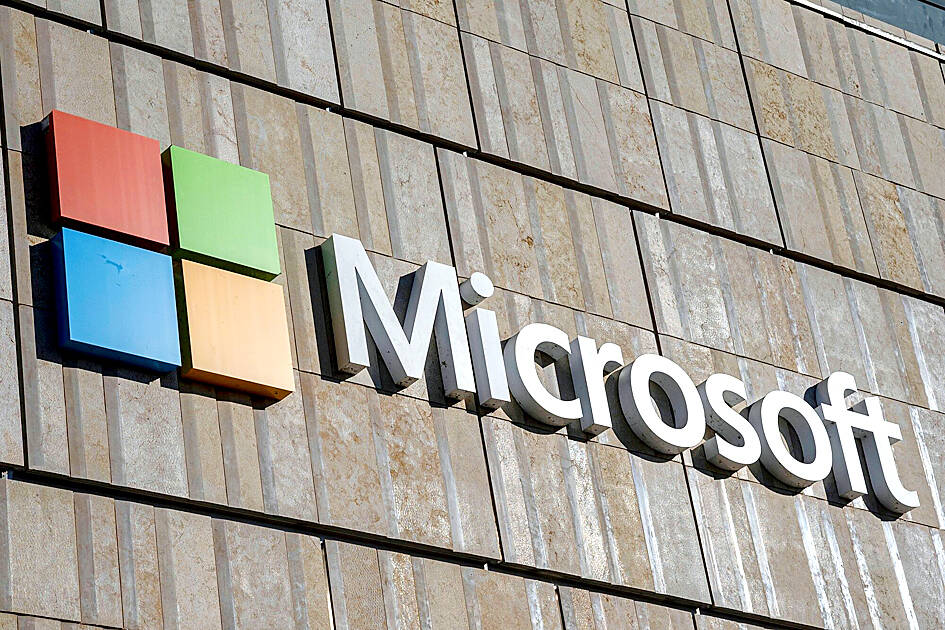Microsoft Corp and OpenAI are investigating whether data output from OpenAI’s technology was obtained in an unauthorized manner by a group linked to Chinese artificial intelligence (AI) start-up DeepSeek (深度求索), according to people familiar with the matter.
Microsoft’s security researchers in the fall observed people they believe might be linked to DeepSeek exfiltrating a large amount of data using the OpenAI application programming interface (API), the people said. Software developers can pay for a license to use the API to integrate OpenAI’s proprietary AI models into their own applications.
Microsoft, an OpenAI technology partner and its largest investor, notified OpenAI of the activity, the people said.

Photo: Bloomberg
Such activity could violate OpenAI’s terms of service or could indicate the group acted to remove OpenAI’s restrictions on how much data they could obtain, the people said.
DeepSeek earlier this month released a new open-source AI model called R1 that can mimic the way humans reason, upending a market dominated by OpenAI and US rivals such as Google and Meta Platforms Inc.
The Chinese upstart said R1 rivaled or outperformed leading US developers’ products on a range of industry benchmarks, including for mathematical tasks and general knowledge — and was built for a fraction of the cost.
US President Donald Trump’s AI czar David Sacks said on Tuesday that there was “substantial evidence” that DeepSeek leaned on the output of OpenAI’s models to help develop its own technology.
In an interview with Fox News, Sacks described a technique called distillation whereby one AI model uses the outputs of another for training purposes to develop similar capabilities.
“There’s substantial evidence that what DeepSeek did here is they distilled knowledge out of OpenAI models and I don’t think OpenAI is very happy about this,” Sacks said, without detailing the evidence.
In a statement responding to Sacks’ comments, OpenAI did not directly address his comments about DeepSeek.
“We know PRC based companies — and others — are constantly trying to distill the models of leading US AI companies,” an OpenAI spokesperson said in the statement, referring to the People’s Republic of China. “As the leading builder of AI, we engage in countermeasures to protect our IP, including a careful process for which frontier capabilities to include in released models, and believe as we go forward that it is critically important that we are working closely with the US government to best protect the most capable models from efforts by adversaries and competitors to take US technology.”

Hon Hai Precision Industry Co (鴻海精密) yesterday said that its research institute has launched its first advanced artificial intelligence (AI) large language model (LLM) using traditional Chinese, with technology assistance from Nvidia Corp. Hon Hai, also known as Foxconn Technology Group (富士康科技集團), said the LLM, FoxBrain, is expected to improve its data analysis capabilities for smart manufacturing, and electric vehicle and smart city development. An LLM is a type of AI trained on vast amounts of text data and uses deep learning techniques, particularly neural networks, to process and generate language. They are essential for building and improving AI-powered servers. Nvidia provided assistance

GREAT SUCCESS: Republican Senator Todd Young expressed surprise at Trump’s comments and said he expects the administration to keep the program running US lawmakers who helped secure billions of dollars in subsidies for domestic semiconductor manufacturing rejected US President Donald Trump’s call to revoke the 2022 CHIPS and Science Act, signaling that any repeal effort in the US Congress would fall short. US Senate Minority Leader Chuck Schumer, who negotiated the law, on Wednesday said that Trump’s demand would fail, while a top Republican proponent, US Senator Todd Young, expressed surprise at the president’s comments and said he expects the administration to keep the program running. The CHIPS Act is “essential for America leading the world in tech, leading the world in AI [artificial

DOMESTIC SUPPLY: The probe comes as Donald Trump has called for the repeal of the US$52.7 billion CHIPS and Science Act, which the US Congress passed in 2022 The Office of the US Trade Representative is to hold a hearing tomorrow into older Chinese-made “legacy” semiconductors that could heap more US tariffs on chips from China that power everyday goods from cars to washing machines to telecoms equipment. The probe, which began during former US president Joe Biden’s tenure in December last year, aims to protect US and other semiconductor producers from China’s massive state-driven buildup of domestic chip supply. A 50 percent US tariff on Chinese semiconductors began on Jan. 1. Legacy chips use older manufacturing processes introduced more than a decade ago and are often far simpler than

Gasoline and diesel prices this week are to decrease NT$0.5 and NT$1 per liter respectively as international crude prices continued to fall last week, CPC Corp, Taiwan (CPC, 台灣中油) and Formosa Petrochemical Corp (台塑石化) said yesterday. Effective today, gasoline prices at CPC and Formosa stations are to decrease to NT$29.2, NT$30.7 and NT$32.7 per liter for 92, 95 and 98-octane unleaded gasoline respectively, while premium diesel is to cost NT$27.9 per liter at CPC stations and NT$27.7 at Formosa pumps, the companies said in separate statements. Global crude oil prices dropped last week after the eight OPEC+ members said they would